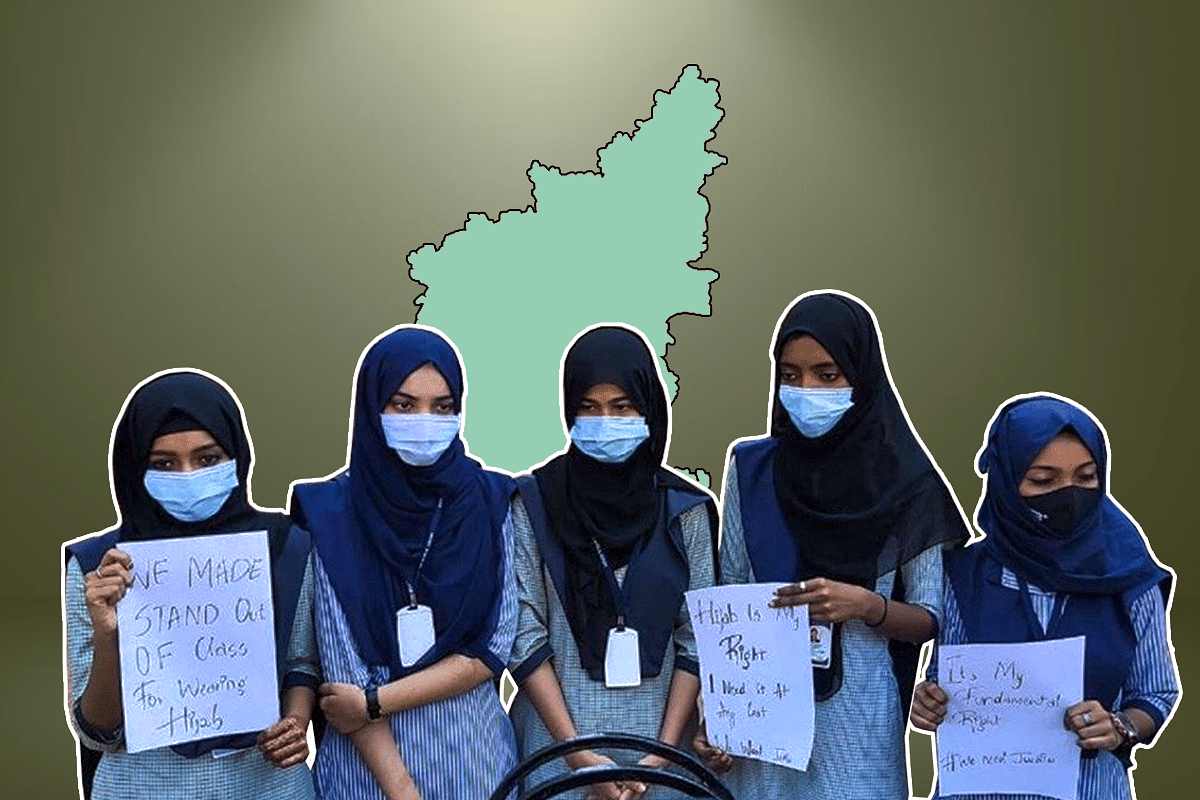News Brief
Solicitor General In Supreme Court: Muslim Students Started Wearing Hijab In 2021 'On Someone Else’s Advice'
- Here's what Solicitor General Tushar Mehta told the Supreme Court in the Karnataka hijab row case.

Karnataka hijab row.
The appeal against the Karnataka High Court judgement wherein it upheld the government order (GO) of the state prohibiting Muslim students from wearing hijab inside classrooms is being heard in the Supreme Court.
A full bench of the Karnataka High Court comprising of the then Chief Justice Ritu Raj Awasthi and justices Krishna Dixit and J M Khazi had held that wearing of hijab by women was not an essential religious practice of Islam, thereby upholding the GO of Karnataka.
The bench held that requirement of uniform dress code in educational institutions is not violative of fundamental rights of the Muslim women.
A batch of 23 petitions has been listed in the Supreme Court before a bench of justices Hemant Gupta and Sudhanshu Dhulia.
While a lot has been already reported on the daily court room exchanges, here we will summarise some important arguments made by the government’s top legal officer, Solicitor General of India, Tushar Mehta.
Mehta submitted before the Supreme Court that female students who have challenged the hijab ban in Karnataka colleges never wore hijab in educational institutions earlier but only started the practice in 2021 “on someone else’s advice”.
He further argued that uniform prescribed by colleges in Karnataka was followed by all the students till 2021, after which a movement was manufactured by the Popular Front of India (PFI), subsequent to which female students started wearing hijab.
He said this was an act of conspiracy, and the submission filed by him contains the particular details of the same.
Mehta was defending the GO of the Karnataka, which empowered college development committees to enforce school uniform code on the college campus. He further stated that had the government not acted in this fashion, it would have been in dereliction of its constitutional duty.
Importantly, he said that the argument accusing the government of throttling the voice of minorities is far-fetched, and that the colleges had also restricted saffron shawls inside the college.
He said it would be a disservice to argue that the circular only deals with hijab.
He added the government is religion-neutral and did not prevent any particular community from wearing a particular apparel.
Furthermore, with respect to whether wearing of hijab is an essential religious practice, he said that a religious practice could be categorised as essential only when it could be traced back to the origin of the religion itself or it is so compelling that one could not fathom the practice from the religion.
He said the fact that the Quran mentions wearing of hijab would not by default make it an essential religious practice.
With respect to Sikhs wearing the pagdi, he said that one cannot even think of a Sikh without a pagdi, but the same is not the case with hijab.
Lastly, he argued that a dress cannot show religious identity when you step inside a secular institution.
He remarked that if tomorrow the Bar Council prohibits tilak, we will have to abide by the same, unless we can show that it is an essential religious practice, which it is not.
He said that there is a statutory power to prescribe uniform in schools.
Support Swarajya's 50 Ground Reports Project & Sponsor A Story
Every general election Swarajya does a 50 ground reports project.
Aimed only at serious readers and those who appreciate the nuances of political undercurrents, the project provides a sense of India's electoral landscape. As you know, these reports are produced after considerable investment of travel, time and effort on the ground.
This time too we've kicked off the project in style and have covered over 30 constituencies already. If you're someone who appreciates such work and have enjoyed our coverage please consider sponsoring a ground report for just Rs 2999 to Rs 19,999 - it goes a long way in helping us produce more quality reportage.
You can also back this project by becoming a subscriber for as little as Rs 999 - so do click on this links and choose a plan that suits you and back us.
Click below to contribute.
Latest